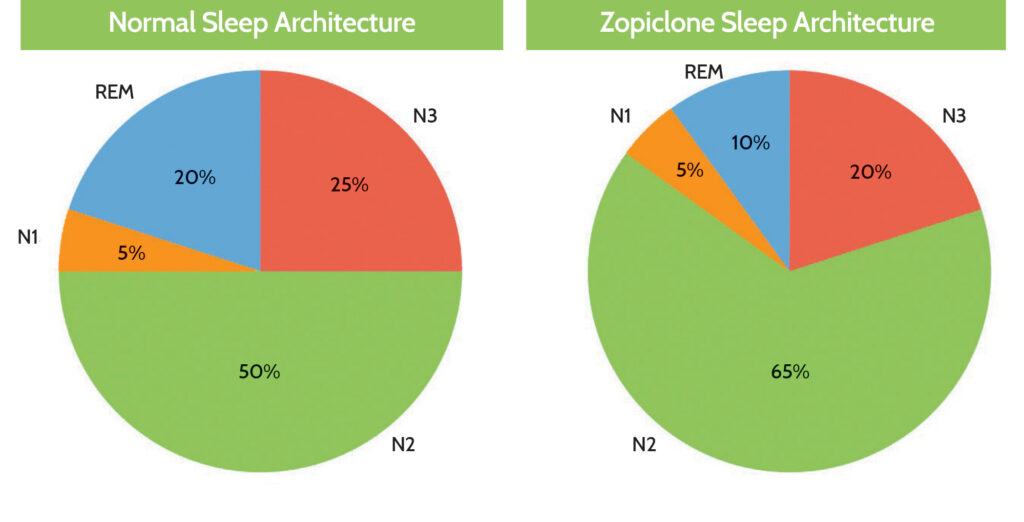While many people focus on getting “enough hours” of sleep, what really determines how rested you feel is your sleep architecture – the structure and distribution of different sleep stages your brain cycles through at night.
At CleverSleep®, our pharmacy team use advanced sleep science to analyse these stages:
- N1 (Light Sleep): The transition from wakefulness
- N2: A deeper form of light sleep where brain activity slows and memory processing begins
- N3 (Deep Sleep): Where physical repair, immune support, and energy restoration take place
- REM (Rapid Eye Movement): Where dreaming, emotional reset, and memory consolidation occur
When medications interfere with these stages – especially REM and deep N3 sleep – you may technically sleep for 7-8 hours but wake up feeling groggy, flat, or unrefreshed.
What Zopiclone does to your sleep
Let’s take a closer look at Zopiclone, New Zealand’s most commonly prescribed sleep medication.
Although Zopiclone can help you fall asleep faster and reduce night awakenings, it shifts your sleep architecture in ways which may have long-term consequences. Most notably, it:
- Reduces REM sleep: This impairs emotional regulation, memory consolidation, and stress recovery.
- Reduces deep N3 sleep: Limiting the body’s opportunity for physical repair and immune strengthening.
- Increases N2 sleep: A lighter, less restorative phase that dominates the night.

Above is a visual comparison between normal sleep architecture and sleep under the influence of Zopiclone.
This is why many people taking Zopiclone report still feeling tired, mentally foggy, or emotionally flat – even after a full night’s sleep.
The hidden cost of medicated sleep
Our research shows that Zopiclone is not alone. Over 50 common medications, including antidepressants, beta blockers, corticosteroids, and even allergy medications, can negatively impact sleep quality.
In many cases, the effects of Zopiclone are subtle but cumulative, gradually eroding the quality of your rest night after night potentially leading to additional health issues.
This isn’t just a theoretical concern:
- Reduced REM is linked with mood disorders, poor memory, and even increased risk of Alzheimer’s.
- Reduced N3 is associated with fatigue, inflammation, and poor immunity.
- Elevated N2 sleep often observed in people using sedative medications – can come at the expense of REM and deep N3 sleep, which are essential for emotional and physical repair and restoration.
What can you do?
Understanding how medications affect your sleep is the first step toward real, restorative rest.
At CleverSleep®, our mission is to educate and empower you with science-backed solutions that support healthy, natural sleep cycles. If you’re taking any medications and not sleeping well or waking up tired, we invite you to explore your sleep wellbeing with our experienced team.
Having just been down at the General Practice conference in Christchurch I can share with you that GPs are mostly unaware of this issue and if they are, they are overloaded and may not be able to give your medicine a thorough review to ensure you get great sleep.
Our Medicine Review and Sleep Reset Programme service is phenomenally effective with more than 90% of those who have worked with us so far experiencing improvements in their sleep.
Please visit us at www.cleversleep.co.nz for pricing and information.

